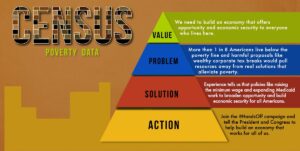Census Data and Storytelling
U.S. Census data released today tells a story of the kind of progress that we can, and should, continue to make, when we invest in programs that expand opportunity. We also know that these successes will be short-lived if we see drastic cuts in these same initiatives. Below are a few tips for talking about the release of this important data, and the story it tells us.

Lead with Values: This data is important, but we have to spend a little bit of time telling audiences why that is; what it really stands for and the story it really tells us. Use a values lens to do this, focusing on Opportunity, Family, Dignity, Pragmatism/Common Sense, and American Ingenuity. Each of these represents why these programs really matter; what they protect and promote, and what they represent in terms of our American identity. Ask audiences what kind of country we want to be – the kind that promotes dignity, supports families, and uses our can-do spirit to find ways to continue to expand opportunity for everyone here? Or the kind that stops progress in its tracks, cutting off those in need in favor of tax cuts to corporations and the very wealthy?
Connect the dots: Show how decision makers, investments, policy choices, and outcomes are all related.
- Audiences’ default thinking about “the economy” tends to view it as an uncontrollable phenomenon like the weather, or a wild animal that does as it pleases. We need to frame it as the result of policy choices by specific decision makers that can (and should) be crafted to meet the goals of opportunity for all. In particular, lift up the positive gains made during the Obama Administration and connect them to specific programs and investments.
- Show how current administration’s proposals endanger this success, and the well-being of millions of ordinary people, so that corporations and the wealthiest can move away from paying their fair share. For instance, nutrition, health care, and energy assistance programs alone kept millions out of poverty. But the recently-proposed budget takes us backward on all of these fronts. Health insurance gains –largely driven by Medicaid expansion—are particularly at risk. While the repeal of the Affordable Care Act failed, waivers and attempts to sabotage insurance markets are threatening to reverse the progress we’ve made.
- Be clear that these numbers tell only part of the story. Even in this improved environment, most Americans continue to face steep obstacles to economic security and basic opportunity like a job that pays decent wages or the chance to send their kids to college. We need solutions that preserve the gains while expanding opportunity for an economy that works for all of us.
Be strategic with language: Instead of talking about “the poor” or “people in poverty,” speak at a more personal level – ‘families like mine’ or ‘you and your family’ – to move audiences’ understanding from charity for others to personal advocacy. Talking about people/families “struggling to make ends meet” also connects with strategic audiences. Finally, focusing on families/people “facing” “hurdles” or “obstacles,” can highlight that the fault lies with the system, and not with the family.
Equal opportunity matters: In addition to overall progress on poverty, highlight findings about racial, ethnic, and gender equity, which may tell a different story—or multiple stories. At the values level, this means establishing greater and more equal opportunity as among the nation’s goals. As with the overall numbers, identify specific policy principles that contributed to any progress (or kept things from being even worse than they are); choices that held us back; and solutions going forward. This is especially important regarding racial inequality, as people tend to misattribute differing outcomes to differing work ethic and “culture,” or purely socioeconomic class differences.
Underscore the importance of this data: Highlight the importance of the Census in providing accurate, unbiased information about the health and prosperity of our nation, as well as our progress toward the goals of greater and more equal opportunity for all.
Highlight a positive role for government: Hurricanes Harvey and Irma and the terrible aftermath remind audiences of government’s crucial role, as well as the unpredictable economic and other challenges that we all face over the course of our lifetimes. Underscore the importance of government in providing support systems for Americans facing misfortune, while expanding opportunity for all.

Building a Message
We recommend structuring messages in terms of Value, Problem, Solution, and Action. You can use the themes and recommendations above to build a message around the specific policy solutions you need to highlight. For example:
Value: We need to build an economy that offers opportunity and economic security to everyone who lives here. Every family should have access to a quality education, a job that enables them to provide for their family, affordable healthcare, and a dignified retirement.
Problem: The latest numbers show that our nation made progress toward that goal over the last eight years. Smart policy decisions like The Affordable Care Act, investing in tax credits for working families, and state-level minimum wage increases helped bring our economy back from the brink of depression. [Specific illustrative data findings]. But we have a long way to go to ensure that every family in our country has the opportunity to live their dreams. [more data] What’s more, wrongheaded proposals by the administration and congressional leadership would not only endanger the progress we’ve made but take us sharply in the wrong direction. Harmful proposals like a tax giveaway to the wealthiest corporations or an expensive and irrational border wall go against our values as a nation, and would pull resources away from real solutions.
Solution: Experience tells us what works to expand opportunity and build economic security for all Americans. Solutions include [Illustrative policy solutions].
Action: Join the #HandsOff campaign and tell the President and Congress to help build an economy that works for all of us.


